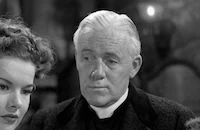Sweater Girl
Cast & Crew
William Clemens
Eddie Bracken
June Preisser
Phillip Terry
Nils Asther
Frieda Inescort
Film Details
Technical Specs

Synopsis
Midvale College graduating seniors rehearse their annual Sweater Girl spring revue, which is directed by "Happy" Dudley, and features songs written by Johnny Arnold and performances by Louise Menard, Jack Mitchell and Susan Lawrence. Louise is having a surreptitious affair with Susan's brother, Professor Martin Lawrence, and Susan is pursuing Jack, who also is enamored of Louise. One day during rehearsal, Jack and Johnny's close friend, school reporter Miles Tucker, dies, and the coroner calls his death suicide by poisoning. When Johnny is later strangled to death, Jack and Susan suspect that both he and Miles were murdered, and decide to investigate for themselves. In Miles' office, they discover a self-addressed letter from an admirer, and give the letter to Martin and police investigator McGill. They determine that Miles was killed by poison placed on the flap of the envelope, and that the killer used a typewriter with a defective "e" key. Rehearsals for the revue resume and, one night as a favor, Jack stays at Louise's house while she rehearses so that he can look after her invalid mother. When Louise leaves rehearsal early, Susan becomes suspicious and rushes to the Menard house. There she finds Mrs. Menard crawling on the floor to help Jack, who was nearly strangled to death by an unknown assailant. Susan follows the housekeeper's retarded son Freddy downstairs, and notices that the same type of rope used against Jack is missing from some bales of paper. The next day, Susan takes McGill into the basement, but the stacks of paper are gone. Their suspicions are aroused after McGill discovers a typewriter with a damaged "e" key. Louise's father, professor Henri Menard, pays Jack a visit and questions him about an old photograph of Jack with three friends, Miles, Johnny and a younger friend, Dick Penfield, who died much earlier of heart failure. When Menard returns home from his interview with Jack, he prepares to leave town, but Mrs. Menard refuses to go with him. Menard accuses his wife of having faked her disability and she becomes hysterical. She reveals that she has been seeking vengeance against Jack, Miles and Johnny for the death of Dick, her son from a previous marriage. Although Dick died of heart failure, she blames the boys because he was taking part in an initiation in which he was left alone in a cemetery at night. Mrs. Menard confesses to the murders of Miles and Johnny, and reveals that she has sent Freddy to put real bullets in the prop gun at the college, which Susan will fire at Jack during the revue. Mrs. Menard is arrested, and McGill rushes to the auditorium to save Jack but arrives just as Susan fires the gun. Jack collapses, as he is called to do in his part, but is unharmed because Susan had poor aim. Susan finally gets her man, Jack, but he then enlists in the Army.

Director
William Clemens
Cast

Eddie Bracken

June Preisser

Phillip Terry

Nils Asther

Frieda Inescort
Betty Jane Rhodes
Kenneth Howell
Johnnie Johnston

William Henry
Ella Neal
Minerva Urecal

Charles D. Brown
Isabel Withers
Robert Cherry
William Cabanne

William Wright
Eddy Chandler
Francis Sayles
Gladden James
Harry Hayden
Lee Shumway
Richard Crane
George Offerman Jr.
Tommy Hicks
Leonard Sues
Joel Dean
Crew
Robert Blees
John Coonan
Beulah Marie Dix
Haldane Douglas
Hans Dreier
Gene Garvin
Dave Gould
Eve Greene
George Hope
Sam Ledner
Frank Loesser
Alma Macrorie
John Mescall
Bertram Millhauser
Joseph Sistrom
Jule Styne
Philip Wisdom
Victor Young

Film Details
Technical Specs

Quotes
Trivia
Notes
The working titles of this film were Terror by Night and Sing a Song of Homicide. Sing a Song of Homicide, the title of a James Langham novel, was also a working title for the Paramount film Night in New Orleans, which is based on Langham's book. According to a Hollywood Reporter news item, story elements from Langham's novel were to be incorporated into this film, and Republic singing star Mary Lee was to be featured. According to Los Angeles Times, the title was changed to capitalize on the popularity of the song "Sweater Song." Composer Jule Styne was loaned to Paramount for the film. The song "I Don't Want to Walk Without You, Baby" played for twenty weeks on the Hit Parade, and later became a favorite with soldiers during World War II. Paramount's 1935 film College Scandal, directed by Elliott Nugent and starring Arline Judge and Kent Taylor, is also based on the original story by Beulah Marie Dix and Bertram Millhauser (see AFI Catalog of Feature Films, 1931-40; F3.0768).












